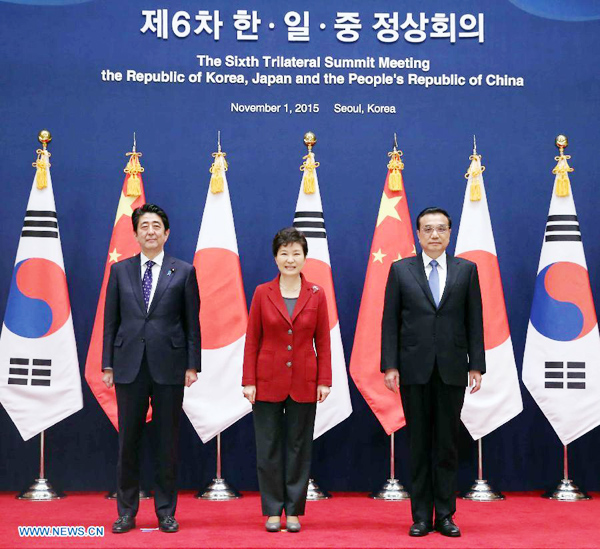 |
|
Chinese Premier Li Keqiang (R), Japanese Prime Minister Shinzo Abe (L) and South Korean President Park Geun-hye attend the sixth China-Japan-South Korea leaders' meeting in the South Korean capital of Seoul, Nov 1, 2015. [Photo/Xinhua] |
BEIJING - The sixth China-Japan-South Korea leaders' meeting held in Seoul on Sunday has promoted bilateral relations, regional stability and cooperation among other important issues, officials and experts said.
UN Secretary-General Ban Ki-moon on Sunday warmly welcomed the trilateral summit held among Chinese Premier Li Keqiang, Japanese Prime Minister Shinzo Abe and South Korean President Park Geun-hye, praising the leaders for resuming the cooperation mechanism among the countries.
In a statement released by his spokesperson's office, Ban said he "hopes that the resumption of the trilateral meeting format will reinforce the collaboration among the three countries, and foster strengthened cooperation in Northeast Asia."
The resumption of the summit mechanism after a three-and-half-year break indicates that cooperation among the three countries is finding its way out of the straits, returning to the right track and entering a new phase, said Yang Houlan, secretary-general of the Seoul-based China-Japan-South Korea Trilateral Cooperation Secretariat.
"The leaders' summit may become the new starting point for the East Asian order," said Park Cheol-hee, an expert at Seoul National University.
In a press release after the summit, Li said that the three sides had a frank exchange of views, reached many consensuses and agreed to promote their cooperation on the basis of facing up to history, looking forward to the future, and properly handling historical and other sensitive issues.
There is no doubt that Japan's attitude toward historical issues and rightist policies have hampered its efforts to improve its relations with China and South Korea.
Yang Bojiang, deputy head of the Institute of Japan Study of the Chinese Academy of Social Sciences, said that "the meeting will help improve ties and prevent Japan from going further down a wrong path."
"Despite the handicap of the political ups and downs in relations between China and Japan and between South Korea and Japan and the weakness in the foundations of trust, a thriving center of economic growth and interdependence has been built among the Northeast Asian economies," said Peter Drysdale, economist and editor of the East Asia Forum at the Australian National University.
The joint declaration issued after the meeting stresses the need to improve bilateral ties, which constitute an important foundation for trilateral cooperation.
It also acknowledges that deepening trilateral cooperation will in turn contribute to each bilateral relationship, and to peace and stability in Northeast Asia.
Ruan Zongze, vice president of China Institute of International Studies, told Xinhua that the meeting will surely help improve China-Japan-South Korea ties as well as regional stability and development.
It will create a sound atmosphere that will restrain relevant parties from misbehaving and invigorate trilateral cooperation at different levels, said Ruan.
In the joint declaration, the three sides also agreed to expand people-to-people exchanges so as to dispel negative national public sentiments among the three Northeast Asian neighbors.
"The meeting will help reverse the two peoples' perception of each other, improve Chinese people's understanding of their Japanese counterparts, and correct the latter's wrong perception of China-Japan ties," Yang Xiyu, a senior researcher with the China Institute of International Studies, a Beijing-based think tank, told Xinhua.
"This meeting will help create a good atmosphere for future communication, and brings more opportunities," he said.
"Trilateral cooperation on such topics as conventional security issues and non-conventional security issues like climate change, environmental issues, nuclear safety and anti-terrorism would lead to, or at least be conducive to, turning negative perceptions of others into favorable ones," said Kim Han-know, assistant professor at the Department of Asian and Pacific Studies at the Korea National Diplomatic Academy.
The China-Japan-South Korea summits had taken place annually from 2008 to 2012 before they bogged down due to Japanese provocations on historical and territorial issues that angered both China and South Korea.
The next summit is expected to be held next year in Japan.